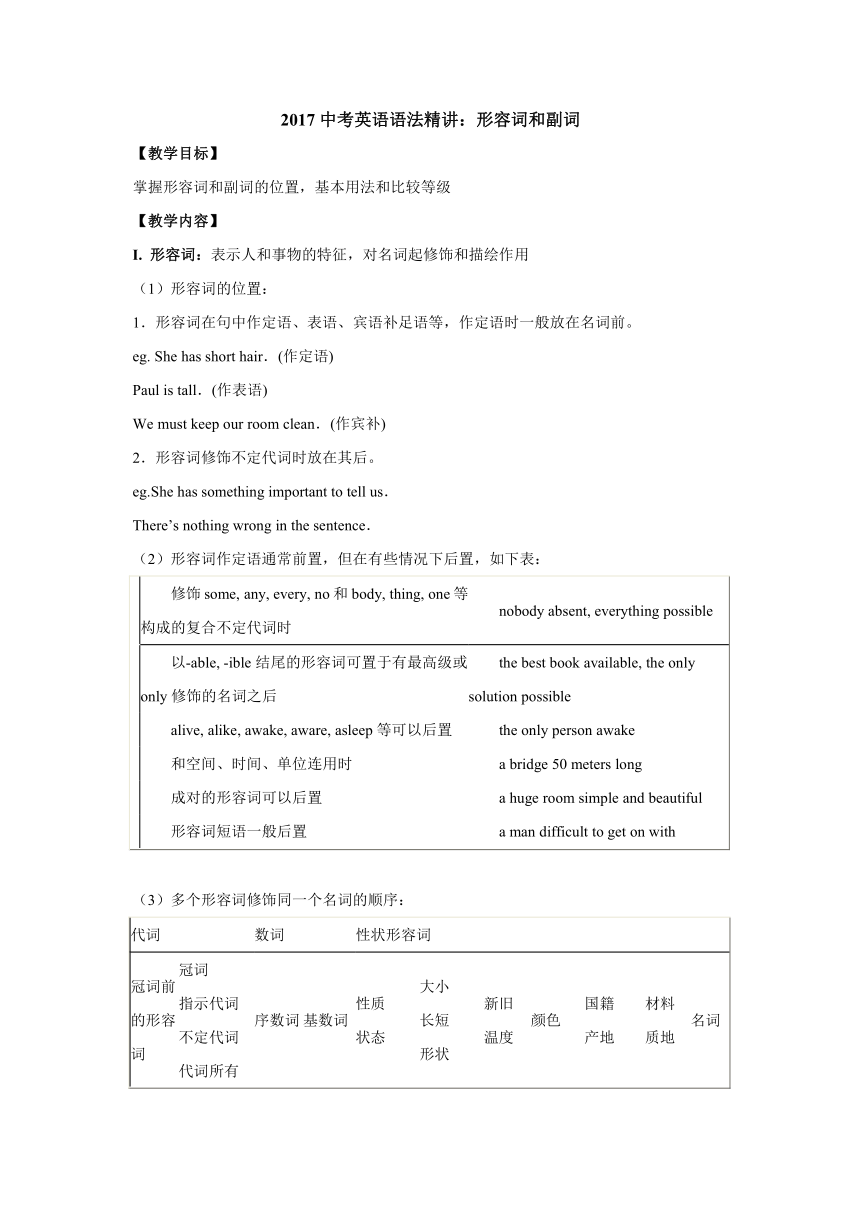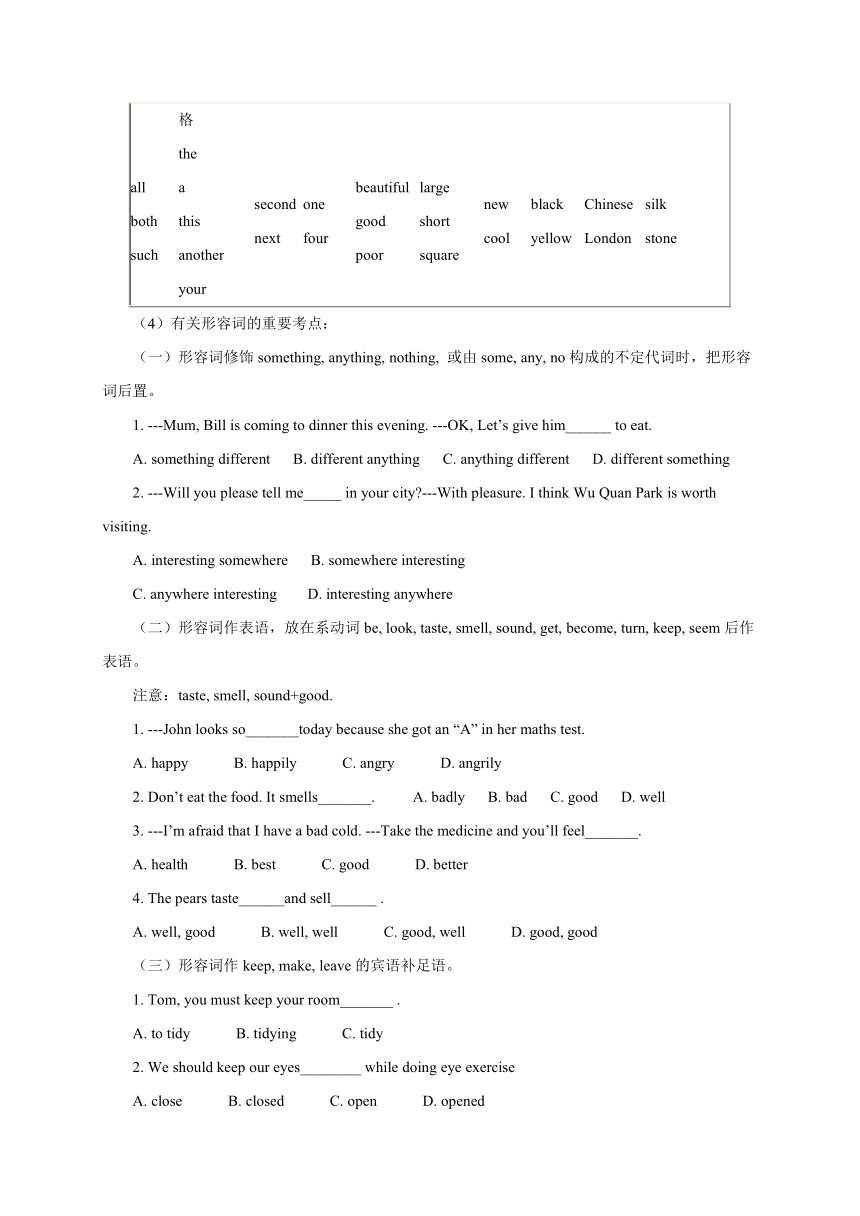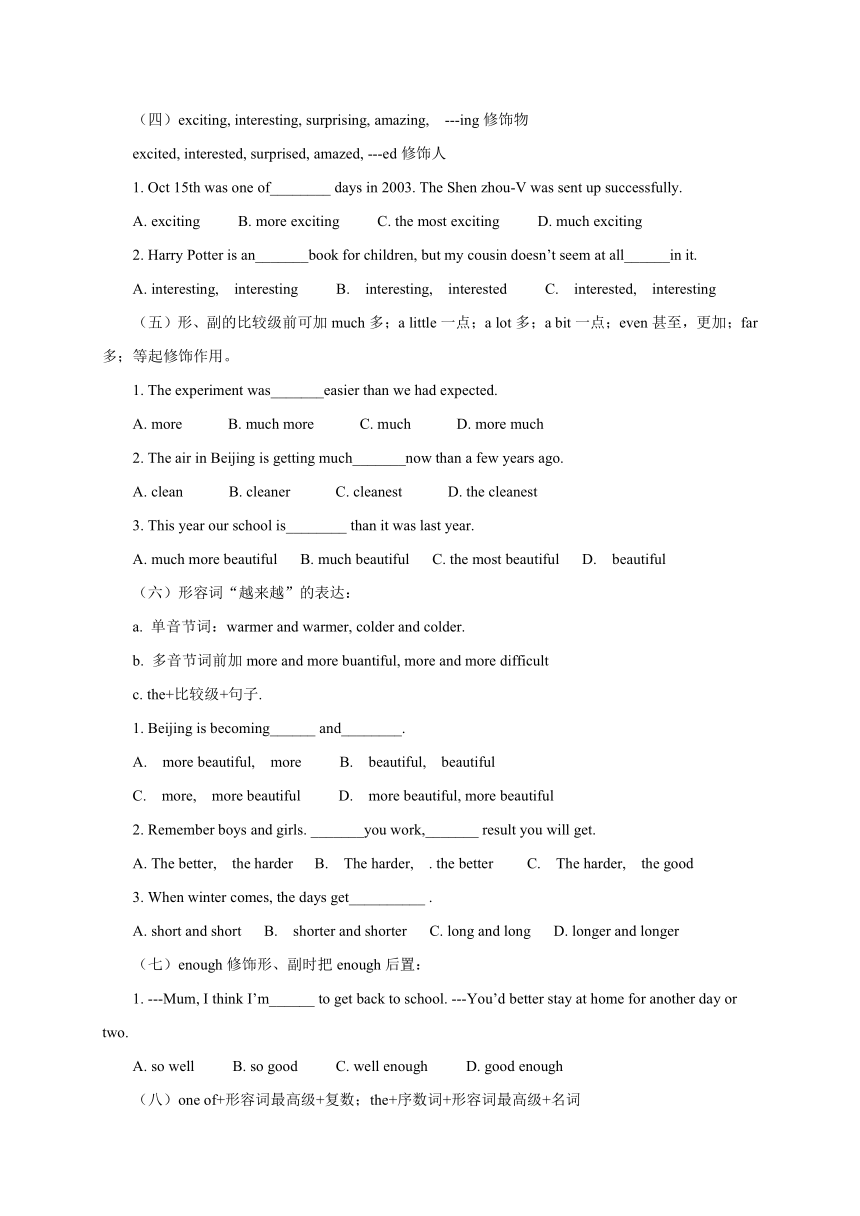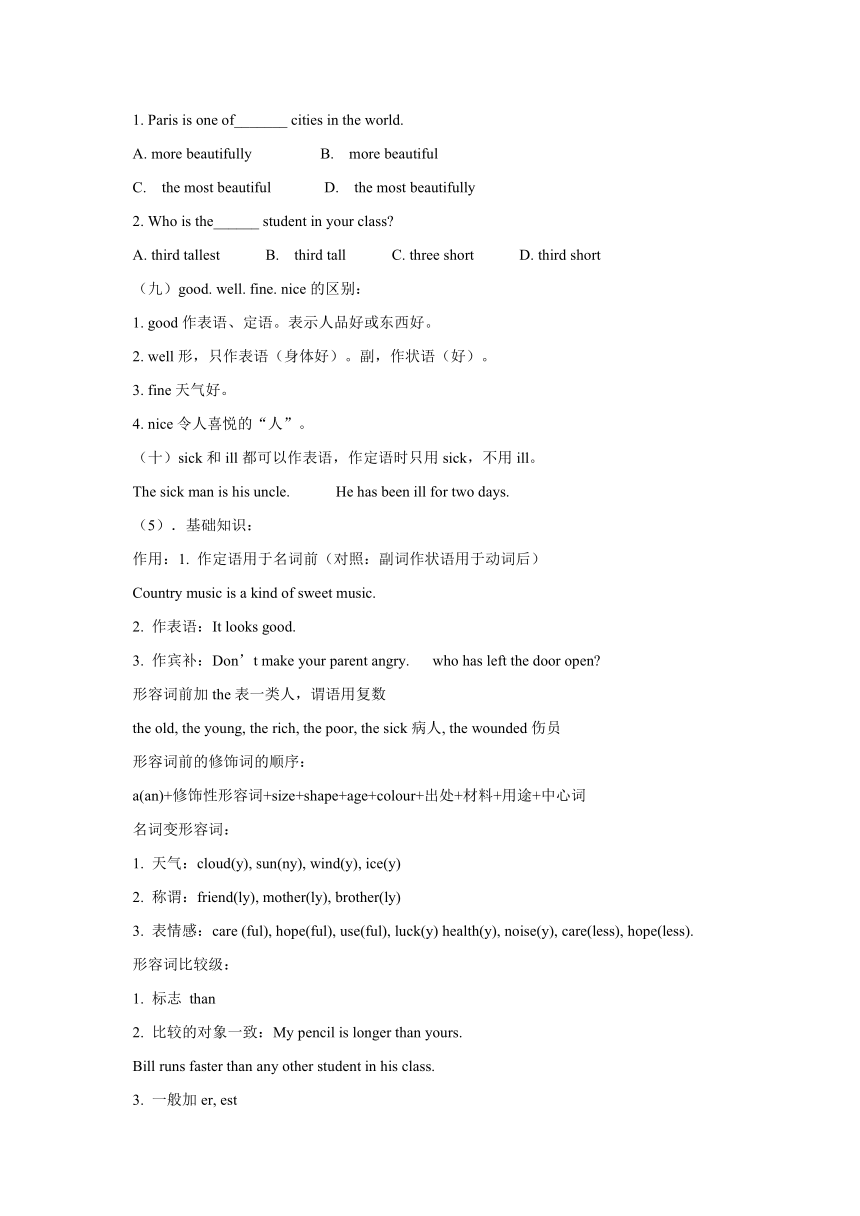2017届中考英语语法精讲:形容词和副词
文档属性
| 名称 | 2017届中考英语语法精讲:形容词和副词 |

|
|
| 格式 | zip | ||
| 文件大小 | 132.0KB | ||
| 资源类型 | 教案 | ||
| 版本资源 | 通用版 | ||
| 科目 | 英语 | ||
| 更新时间 | 2017-05-16 00:00:00 | ||
图片预览





文档简介
2017中考英语语法精讲:形容词和副词
【教学目标】
掌握形容词和副词的位置,基本用法和比较等级
【教学内容】
I.
形容词:表示人和事物的特征,对名词起修饰和描绘作用
(1)形容词的位置:
1.形容词在句中作定语、表语、宾语补足语等,作定语时一般放在名词前。
eg.
She
has
short
hair.(作定语)
Paul
is
tall.(作表语)
We
must
keep
our
room
clean.(作宾补)
2.形容词修饰不定代词时放在其后。
eg.She
has
something
important
to
tell
us.
There’s
nothing
wrong
in
the
sentence.
(2)形容词作定语通常前置,但在有些情况下后置,如下表:
1
修饰some,
any,
every,
no和body,
thing,
one等构成的复合不定代词时
nobody
absent,
everything
possible
2
以-able,
-ible结尾的形容词可置于有最高级或only修饰的名词之后
the
best
book
available,
the
only
solution
possible
3
alive,
alike,
awake,
aware,
asleep等可以后置
the
only
person
awake
4
和空间、时间、单位连用时
a
bridge
50
meters
long
5
成对的形容词可以后置
a
huge
room
simple
and
beautiful
6
形容词短语一般后置
a
man
difficult
to
get
on
with
(3)多个形容词修饰同一个名词的顺序:
代词
数词
性状形容词
冠词前的形容词
冠词指示代词不定代词代词所有格
序数词
基数词
性质状态
大小长短形状
新旧温度
颜色
国籍产地
材料质地
名词
allbothsuch
theathisanotheryour
secondnext
onefour
beautifulgoodpoor
largeshortsquare
newcool
blackyellow
ChineseLondon
silkstone
(4)有关形容词的重要考点:
(一)形容词修饰something,
anything,
nothing,
或由some,
any,
no构成的不定代词时,把形容词后置。
1.
---Mum,
Bill
is
c
( http: / / www.21cnjy.com )oming
to
dinner
this
evening.
---OK,
Let’s
give
him______
to
eat.
A.
something
differen
( http: / / www.21cnjy.com )t
B.
different
anything
C.
anything
different
D.
different
something
2.
---Will
you
please
( http: / / www.21cnjy.com )
tell
me_____
in
your
city ---With
pleasure.
I
think
Wu
Quan
Park
is
worth
visiting.
A.
interesting
somewhere
B.
somewhere
interesting
C.
anywhere
interesting
D.
interesting
anywhere
(二)形容词作表语,放在系
( http: / / www.21cnjy.com )动词be,
look,
taste,
smell,
sound,
get,
become,
turn,
keep,
seem后作表语。
注意:taste,
smell,
sound+good.
1.
---John
looks
so
( http: / / www.21cnjy.com )_______today
because
she
got
an
“A”
in
her
maths
test.
A.
happy
B.
happily
C.
angry
D.
angrily
2.
Don’t
eat
the
( http: / / www.21cnjy.com )food.
It
smells_______.
A.
badly
B.
bad
C.
good
D.
well
3.
---I’m
afraid
( http: / / www.21cnjy.com )that
I
have
a
bad
cold.
---Take
the
medicine
and
you’ll
feel_______.
A.
health
B.
best
C.
good
D.
better
4.
The
pears
taste______and
sell______
.
A.
well,
good
B.
well,
well
C.
good,
well
D.
good,
good
(三)形容词作keep,
make,
leave的宾语补足语。
1.
Tom,
you
must
keep
your
room_______
.
A.
to
tidy
B.
tidying
C.
tidy
2.
We
should
keep
our
eyes________
while
doing
eye
exercise
A.
close
B.
closed
C.
open
D.
opened
(四)exciting,
interesting,
surprising,
amazing,
---ing修饰物
excited,
interested,
surprised,
amazed,
---ed修饰人
1.
Oct
15th
w
( http: / / www.21cnjy.com )as
one
of________
days
in
2003.
The
Shen
zhou-V
was
sent
up
successfully.
A.
exciting
( http: / / www.21cnjy.com )
B.
more
exciting
C.
the
most
exciting
D.
much
exciting
2.
Harry
Potter
is
( http: / / www.21cnjy.com )an_______book
for
children,
but
my
cousin
doesn’t
seem
at
all______in
it.
A.
interesting,
in
( http: / / www.21cnjy.com )teresting
B.
interesting,
interested
C.
interested,
interesting
(五)形、副的比较级前可加much多;a
little一点;a
lot多;a
bit一点;even甚至,更加;far多;等起修饰作用。
1.
The
experiment
was_______easier
than
we
had
expected.
A.
more
B.
much
more
C.
much
D.
more
much
2.
The
air
in
Beijing
is
getting
much_______now
than
a
few
years
ago.
A.
clean
B.
cleaner
C.
cleanest
D.
the
cleanest
3.
This
year
our
school
is________
than
it
was
last
year.
A.
much
more
beau
( http: / / www.21cnjy.com )tiful
B.
much
beautiful
C.
the
most
beautiful
D.
beautiful
(六)形容词“越来越”的表达:
a.
单音节词:warmer
and
warmer,
colder
and
colder.
b.
多音节词前加more
and
more
buantiful,
more
and
more
difficult
c.
the+比较级+句子.
1.
Beijing
is
becoming______
and________.
A.
more
beautiful,
more
B.
beautiful,
beautiful
C.
more,
more
beautiful
D.
more
beautiful,
more
beautiful
2.
Remember
boys
and
( http: / / www.21cnjy.com )
girls.
_______you
work,_______
result
you
will
get.
A.
The
better,
th
( http: / / www.21cnjy.com )e
harder
B.
The
harder,
.
the
better
C.
The
harder,
the
good
3.
When
winter
comes,
the
days
get__________
.
A.
short
and
short
( http: / / www.21cnjy.com )
B.
shorter
and
shorter
C.
long
and
long
D.
longer
and
longer
(七)enough修饰形、副时把enough后置:
1.
---Mum,
I
th
( http: / / www.21cnjy.com )ink
I’m______
to
get
back
to
school.
---You’d
better
stay
at
home
for
another
day
or
two.
A.
so
well
B.
so
good
C.
well
enough
D.
good
enough
(八)one
of+形容词最高级+复数;the+序数词+形容词最高级+名词
1.
Paris
is
one
of_______
cities
in
the
world.
A.
more
beautifully
B.
more
beautiful
C.
the
most
beautiful
D.
the
most
beautifully
2.
Who
is
the______
student
in
your
class
A.
third
tallest
( http: / / www.21cnjy.com )
B.
third
tall
C.
three
short
D.
third
short
(九)good.
well.
fine.
nice的区别:
1.
good作表语、定语。表示人品好或东西好。
2.
well形,只作表语(身体好)。副,作状语(好)。
3.
fine天气好。
4.
nice令人喜悦的“人”。
(十)sick和ill都可以作表语,作定语时只用sick,不用ill。
The
sick
man
is
his
uncle.
He
has
been
ill
for
two
days.
(5).基础知识:
作用:1.
作定语用于名词前(对照:副词作状语用于动词后)
Country
music
is
a
kind
of
sweet
music.
2.
作表语:It
looks
good.
3.
作宾补:Don’t
make
your
parent
angry.
who
has
left
the
door
open
形容词前加the表一类人,谓语用复数
the
old,
the
young,
the
rich,
the
poor,
the
sick病人,
the
wounded伤员
形容词前的修饰词的顺序:
a(an)+修饰性形容词+size+shape+age+colour+出处+材料+用途+中心词
名词变形容词:
1.
天气:cloud(y),
sun(ny),
wind(y),
ice(y)
2.
称谓:friend(ly),
mother(ly),
brother(ly)
3.
表情感:care
(ful),
ho
( http: / / www.21cnjy.com )pe(ful),
use(ful),
luck(y)
health(y),
noise(y),
care(less),
hope(less).
形容词比较级:
1.
标志
than
2.
比较的对象一致:My
pencil
is
longer
than
yours.
Bill
runs
faster
than
any
other
student
in
his
class.
3.
一般加er,
est
4.
以不发音e结尾加r,
st
5.
双写:thin-thinner-thinnest,
hot-hotter-hottest,
fat-fatter-fattest
6.
辅音字母+y的变y为i+er,
est
easy-easier-easiest
7.
双音节词加more,
the
most
difficult-more
difficult-most
difficult.
8.
以后缀-ful结尾的形容词加more,
the
most
useful-more
useful–the
most
useful
9.
不规则:good/we
( http: / / www.21cnjy.com )ll-better,
best;bad,
ill/badly-worse,
worst;many,
much-more,
most;little-less-least;far-farther-farthest。
形容词最高级:1.
标志:in
(后不同类);of
(后同类)
2.
加est。
(6)复合形容词的构成:
1
形容词+名词+ed
kind-hearted
6
名词+形容词
world-famous
2
形容词+形容词
dark-blue
7
名词+现在分词
peace-loving
3
形容词+现在分词
ordinary-looking
8
名词+过去分词
snow-covered
4
副词+现在分词
hard-working
9
数词+名词+ed
three-egged
5
副词+过去分词
newly-built
10
数词+名词
twenty-year
II.
副词
副词起修饰动词,形容词,其他副词或全句的作用,表示时间,地点,程度,方式或性质等。
1.副词的种类
(1)时间副词
①表示大体时间:now,then,ye
( http: / / www.21cnjy.com )sterday,today,
tonight,before,justnow,recently,sO faf
②表示频率:always,usually,often,sometimes.seldom,never
③其它作用:already,yet,late,early,soon,at
once,immediately,atfirst,at
last,finally
(2)地点副词
①表地点:here,there,hom
( http: / / www.21cnjy.com )e,abroad,upstairs,downstairs,anywhere,everywhere,nowhere,somewhere
②表位置关系(后接宾语时,用作介词):a
( http: / / www.21cnjy.com )bove,below,round,around,down,up,in,out,inside,outside,across,back,along,over,away,near,off,past
(3)方式副词
表示谓语动词“怎样地”,(此类副词大部分由形容词加ly构成):badly,bravely,gratefully,calmly,carefully,carelessly,nervously,proudly,patiently,politely,sadly,properly,rapidly,wrongly,suddenly
(4)程度副词
多数用来修饰形容词或副词:
( http: / / www.21cnjy.com )much,(a)little,a
bit,very,sO,too,enough,quite,rather,completely,terribly,deeply,nearly,almost,hardly
(5)疑问副词
构成特殊疑问句:how,when,
where,why
(6)连接副词
连接主语、宾语或表语从句:how,when,where,why
(7)关系副词
引导定语从句:when,where,why
(8)其它性质的副词
对整个句
( http: / / www.21cnjy.com )子进行说明,一般用逗号与主句隔开:frankly(坦率地说,说真的),generally(一般说来),luckily(幸运地是),first
of
all(首先)等。
2.副词的用法及位置
(1)修饰动词作状语
①多数位于动词之后,及物动词的宾语或介问的宾语之后。
eg.The
farmers
are
working
hard
in
the
field.
She
speaks
English
well.
The
nurse
looks
after
the
babies
carefully.
②频度副词放在动词前,情态动词和助动词之后。
eg.He
always
goes
to
school
On
foot.
She
was
often
late
for
school.
I
have
never
been
to
Beijing·
(2)修饰形容词作状语,放在形容词前。
eg.He
has
a
very
nice
watch.
The
box
is
too
heavy.
(3)修饰另一副词作状语,放在另一副词前。
eg.She
paints
quite
well.
You
speak
too
fast.I
can’t
understand
you.
(4)作表语,放在系动词后。
eg.Is
anybody
in
(5)作宾语补足语,放在宾语之后。
eg.I
saw
him
out
just
now.
(6)作定语,放在名词之后。
eg.There
is
a
man:here
On
vacation.
(7)疑问副词、修饰整个句子的副词以及perhaps,first,sometimes,finally等副词,一般放在句首。
eg.Finally,I
finished
the
work.
Perhaps
he’s
watching
TV
at
home.
(8)表示程度的副词一般放在被修饰词前,而enough则放在它所修饰的词后。
eg.
He
is
old
enough
to
go
to
school.
3.某些副词在用法上的区别
(1)already,
yet,
still
already表示某事物已经发生,主要
( http: / / www.21cnjy.com )用于肯定句;yet表示期待某事发生,主要用于否定句和疑问句;still表示某事还在进行,主要用于肯定句和疑问句,有时也可用于否定句。如:
We've
already
watched
that
film.
I
haven't
finished
my
homework
yet.
He
still
works
until
late
every
night.
(2)too,
as
well,
also,
either
too,
as
well和
also用于
( http: / / www.21cnjy.com )肯定句和疑问句,too和as
well多用于口语,一般放在句末,而also多用于书面语,一般放在句中与动词连用。either用于否定句和否定的疑问句,往往放在句末。如:He
went
there
too.
He
didn't
go
there
either.
I
like
you
as
well.
I
also
went
there.
(3)
hard,
hardly
hardly意为"几乎"与hard在词义上完全不同。如:
I
work
hard
every
day.
I
can
hardly
remember
that.
(4)
late,
lately
lately意为"最近、近来",late意为"晚、迟"。如:
He
never
comes
late.
Have
you
been
to
the
museum
lately
III.形容词和副词的比较等级
1.比较级、最高级的构成
(1)单音节和少数双音节词
①一般在词尾加er或est
great--greater——greatest,young——younger——youngest,slow→slower→slowest
②以e结尾的只加r或st
nice——nicer----nicest,large——larger—largest.
③以辅音字母加y结尾的,先变y为i,再加er或est
heavy——heavier——heaviest,
easy——easier——>easiest,
busy——busier——busiest,
funny——funnier——+funniest,early——earlier→earliest
④以重读闭音节结尾的词,先双写最末
( http: / / www.21cnjy.com )的一个辅音字母,再加er或est
big——bigger——biggest,
thin——thinner——>thinnest,fat—)fatter→fattest,ht—)fitter→fittest
(2)多音节和部分双音节词,前加more为比较级,加(the)most为最高级
careful→more
careful——most
careful
useful——more
useful——most
useful
popular→more
popular→most
popular
carelessly——more
carelessly——most
carelessly
(3)不规则变化的词
good/well→better→best
bad/ill/badly→worse→worst
many/much→more→most
little→less→least
old→older/elder→oldest(指年龄大小)/eldest(指长幼顺序)
far→farther/further→farthest(指距离)/furthest(指程度)
2.形容词和副词比较级、最高级的用法
(1)形容词和副词比较级的用法
①用于两者比较,表示“比…更…”:
“A+系动词+形容词比较级+than+B,
eg.I
am
two
years
older
than
my
little
sister.
“A+谓语动词+副词比较级+than+B:
eg.
She
gets
to
school
earlier
than
the
other
students.
②用于两者之间的同级比较,表示“…和…一样”:
“A+系动词+as+形容词原级+as+B,
eg.Bill
is
as
funny
as
his
father.
“A+谓语动词+as+副词原级+as+B”
eg.Lucy
speaks
Chinese
as
well
as
Lily.
③表示甲在某方面不如乙:
“A+系动词+notas/so+形容i司原级+as十B”
eg.These
books
aren’t
as
interesting
as
those.
“A+助动词/情态动词+not+谓语动词+aS/SO+B”
eg.She
didn’t
sing
sO
well
that
night
as
she
usually
does.
④表示某个范围内的两者相比:
“A十动词十the+比较级+of短语
( http: / / www.21cnjy.com )(比较范围)”
eg.Penny
is
the
taller
of
the
two
girls.Penny是这两个女孩中较高的一个。
⑤表示“越来越…”:“比较级+and+比较级”
eg.In
spring
the
days
are
getting
longer
and
longer.
在春天,白天变得越来越长。
⑥表示“越…越…”:“the+比较级…the+比较级”
eg.The
mort:you
pra
( http: / / www.21cnjy.com )ctice
using
English,the
better
you’ll
learn
it
你英语练得越多,就会学得越好。
①可以用much,far,even,a
bit,a
little,a
lot等修饰比较级表示程度,但决不可用very修饰。
eg.Tom
is
a
little
taller
than
Mike.Tom比Mike稍高一点;
it
is
even
colder
today
than
yesterday。
今天甚至比昨天更冷
⑧在比较级中,为了避免重复,可用that或those代替前面提到过的事情。
eg.The
weather
( http: / / www.21cnjy.com )
here
is
much
hotter
than
that
Ofour
hometown.这儿比我的老家热得多。
The
pants
in
( http: / / www.21cnjy.com )this
shop
are
a
lot
better
than
those
in
that
shop.这家商店的裤子比那家商店的裤子质量好得多。
(3)形容词和副词最高级的用法
对三者或三者以上的人或物进行比较时用最高级
( http: / / www.21cnjy.com )。形容词最高级前面要加定冠词the,副词最高级前可加the,也可省掉the;后面可带of/in短浯来说明比较范围:
“主语+系动词+the+形容词最高级+of短语/in短语”
eg.She
is
the
youngest
Of all.
“A+谓语动词+(the)+最高级+of短语/in短语”
eg.Linda
draws
most
carefully
in
her
class.
典型例题分析:
例1
Tom's
father
thinks
he
is
already
____
A
high
enough
B
tall
enough
C
enough
high
C
enough
tall
解析:该题正确答案是B。修饰人高用tall,
而建筑物的高用high,并且enough修饰形容词要放在形容词后面。因此该题选B。
例2
____
the
worse
I
seem
to
be.
A
When
I
take
more
medicine
B
The
more
medicine
I
take
C
Taking
more
of
the
medicine
D
More
medicine
taken
解析:该题正确答案为B。"the+形容词比较级+…
,
the
+形容词比较级+…"意为越…,越…。该句意为:吃的药越多,我的病越是加重。
例3"I
haven't
been
to
London
yet".
"I
haven't
been
there
____".
A
too
B
also
C
either
D
neither
解析:该题正确答案为C。A和B都用于肯定句中。D-neither本身意为否定"两者都不",而C-either则用于否定句中,意为"也"。
例4
Mr
Smith
was
____
moved
at
the
news.
A
deep
B
deeply
C
very
deep
D
quite
deeply
解析:该题正确答案为B。A.
deep用于副
( http: / / www.21cnjy.com )词时,修饰具体的深,如dig
deep,而B-deeply则修饰表示感彩的词,如该题为deeply
moved.另如deeply
regret等。而D-quite和deeply均为副词,不能互相修饰。
【课内检测】详见导学案
【作业布置】
1.完成本节课的《同步练习》
2.预习下一讲的导学案。
【教学目标】
掌握形容词和副词的位置,基本用法和比较等级
【教学内容】
I.
形容词:表示人和事物的特征,对名词起修饰和描绘作用
(1)形容词的位置:
1.形容词在句中作定语、表语、宾语补足语等,作定语时一般放在名词前。
eg.
She
has
short
hair.(作定语)
Paul
is
tall.(作表语)
We
must
keep
our
room
clean.(作宾补)
2.形容词修饰不定代词时放在其后。
eg.She
has
something
important
to
tell
us.
There’s
nothing
wrong
in
the
sentence.
(2)形容词作定语通常前置,但在有些情况下后置,如下表:
1
修饰some,
any,
every,
no和body,
thing,
one等构成的复合不定代词时
nobody
absent,
everything
possible
2
以-able,
-ible结尾的形容词可置于有最高级或only修饰的名词之后
the
best
book
available,
the
only
solution
possible
3
alive,
alike,
awake,
aware,
asleep等可以后置
the
only
person
awake
4
和空间、时间、单位连用时
a
bridge
50
meters
long
5
成对的形容词可以后置
a
huge
room
simple
and
beautiful
6
形容词短语一般后置
a
man
difficult
to
get
on
with
(3)多个形容词修饰同一个名词的顺序:
代词
数词
性状形容词
冠词前的形容词
冠词指示代词不定代词代词所有格
序数词
基数词
性质状态
大小长短形状
新旧温度
颜色
国籍产地
材料质地
名词
allbothsuch
theathisanotheryour
secondnext
onefour
beautifulgoodpoor
largeshortsquare
newcool
blackyellow
ChineseLondon
silkstone
(4)有关形容词的重要考点:
(一)形容词修饰something,
anything,
nothing,
或由some,
any,
no构成的不定代词时,把形容词后置。
1.
---Mum,
Bill
is
c
( http: / / www.21cnjy.com )oming
to
dinner
this
evening.
---OK,
Let’s
give
him______
to
eat.
A.
something
differen
( http: / / www.21cnjy.com )t
B.
different
anything
C.
anything
different
D.
different
something
2.
---Will
you
please
( http: / / www.21cnjy.com )
tell
me_____
in
your
city ---With
pleasure.
I
think
Wu
Quan
Park
is
worth
visiting.
A.
interesting
somewhere
B.
somewhere
interesting
C.
anywhere
interesting
D.
interesting
anywhere
(二)形容词作表语,放在系
( http: / / www.21cnjy.com )动词be,
look,
taste,
smell,
sound,
get,
become,
turn,
keep,
seem后作表语。
注意:taste,
smell,
sound+good.
1.
---John
looks
so
( http: / / www.21cnjy.com )_______today
because
she
got
an
“A”
in
her
maths
test.
A.
happy
B.
happily
C.
angry
D.
angrily
2.
Don’t
eat
the
( http: / / www.21cnjy.com )food.
It
smells_______.
A.
badly
B.
bad
C.
good
D.
well
3.
---I’m
afraid
( http: / / www.21cnjy.com )that
I
have
a
bad
cold.
---Take
the
medicine
and
you’ll
feel_______.
A.
health
B.
best
C.
good
D.
better
4.
The
pears
taste______and
sell______
.
A.
well,
good
B.
well,
well
C.
good,
well
D.
good,
good
(三)形容词作keep,
make,
leave的宾语补足语。
1.
Tom,
you
must
keep
your
room_______
.
A.
to
tidy
B.
tidying
C.
tidy
2.
We
should
keep
our
eyes________
while
doing
eye
exercise
A.
close
B.
closed
C.
open
D.
opened
(四)exciting,
interesting,
surprising,
amazing,
---ing修饰物
excited,
interested,
surprised,
amazed,
---ed修饰人
1.
Oct
15th
w
( http: / / www.21cnjy.com )as
one
of________
days
in
2003.
The
Shen
zhou-V
was
sent
up
successfully.
A.
exciting
( http: / / www.21cnjy.com )
B.
more
exciting
C.
the
most
exciting
D.
much
exciting
2.
Harry
Potter
is
( http: / / www.21cnjy.com )an_______book
for
children,
but
my
cousin
doesn’t
seem
at
all______in
it.
A.
interesting,
in
( http: / / www.21cnjy.com )teresting
B.
interesting,
interested
C.
interested,
interesting
(五)形、副的比较级前可加much多;a
little一点;a
lot多;a
bit一点;even甚至,更加;far多;等起修饰作用。
1.
The
experiment
was_______easier
than
we
had
expected.
A.
more
B.
much
more
C.
much
D.
more
much
2.
The
air
in
Beijing
is
getting
much_______now
than
a
few
years
ago.
A.
clean
B.
cleaner
C.
cleanest
D.
the
cleanest
3.
This
year
our
school
is________
than
it
was
last
year.
A.
much
more
beau
( http: / / www.21cnjy.com )tiful
B.
much
beautiful
C.
the
most
beautiful
D.
beautiful
(六)形容词“越来越”的表达:
a.
单音节词:warmer
and
warmer,
colder
and
colder.
b.
多音节词前加more
and
more
buantiful,
more
and
more
difficult
c.
the+比较级+句子.
1.
Beijing
is
becoming______
and________.
A.
more
beautiful,
more
B.
beautiful,
beautiful
C.
more,
more
beautiful
D.
more
beautiful,
more
beautiful
2.
Remember
boys
and
( http: / / www.21cnjy.com )
girls.
_______you
work,_______
result
you
will
get.
A.
The
better,
th
( http: / / www.21cnjy.com )e
harder
B.
The
harder,
.
the
better
C.
The
harder,
the
good
3.
When
winter
comes,
the
days
get__________
.
A.
short
and
short
( http: / / www.21cnjy.com )
B.
shorter
and
shorter
C.
long
and
long
D.
longer
and
longer
(七)enough修饰形、副时把enough后置:
1.
---Mum,
I
th
( http: / / www.21cnjy.com )ink
I’m______
to
get
back
to
school.
---You’d
better
stay
at
home
for
another
day
or
two.
A.
so
well
B.
so
good
C.
well
enough
D.
good
enough
(八)one
of+形容词最高级+复数;the+序数词+形容词最高级+名词
1.
Paris
is
one
of_______
cities
in
the
world.
A.
more
beautifully
B.
more
beautiful
C.
the
most
beautiful
D.
the
most
beautifully
2.
Who
is
the______
student
in
your
class
A.
third
tallest
( http: / / www.21cnjy.com )
B.
third
tall
C.
three
short
D.
third
short
(九)good.
well.
fine.
nice的区别:
1.
good作表语、定语。表示人品好或东西好。
2.
well形,只作表语(身体好)。副,作状语(好)。
3.
fine天气好。
4.
nice令人喜悦的“人”。
(十)sick和ill都可以作表语,作定语时只用sick,不用ill。
The
sick
man
is
his
uncle.
He
has
been
ill
for
two
days.
(5).基础知识:
作用:1.
作定语用于名词前(对照:副词作状语用于动词后)
Country
music
is
a
kind
of
sweet
music.
2.
作表语:It
looks
good.
3.
作宾补:Don’t
make
your
parent
angry.
who
has
left
the
door
open
形容词前加the表一类人,谓语用复数
the
old,
the
young,
the
rich,
the
poor,
the
sick病人,
the
wounded伤员
形容词前的修饰词的顺序:
a(an)+修饰性形容词+size+shape+age+colour+出处+材料+用途+中心词
名词变形容词:
1.
天气:cloud(y),
sun(ny),
wind(y),
ice(y)
2.
称谓:friend(ly),
mother(ly),
brother(ly)
3.
表情感:care
(ful),
ho
( http: / / www.21cnjy.com )pe(ful),
use(ful),
luck(y)
health(y),
noise(y),
care(less),
hope(less).
形容词比较级:
1.
标志
than
2.
比较的对象一致:My
pencil
is
longer
than
yours.
Bill
runs
faster
than
any
other
student
in
his
class.
3.
一般加er,
est
4.
以不发音e结尾加r,
st
5.
双写:thin-thinner-thinnest,
hot-hotter-hottest,
fat-fatter-fattest
6.
辅音字母+y的变y为i+er,
est
easy-easier-easiest
7.
双音节词加more,
the
most
difficult-more
difficult-most
difficult.
8.
以后缀-ful结尾的形容词加more,
the
most
useful-more
useful–the
most
useful
9.
不规则:good/we
( http: / / www.21cnjy.com )ll-better,
best;bad,
ill/badly-worse,
worst;many,
much-more,
most;little-less-least;far-farther-farthest。
形容词最高级:1.
标志:in
(后不同类);of
(后同类)
2.
加est。
(6)复合形容词的构成:
1
形容词+名词+ed
kind-hearted
6
名词+形容词
world-famous
2
形容词+形容词
dark-blue
7
名词+现在分词
peace-loving
3
形容词+现在分词
ordinary-looking
8
名词+过去分词
snow-covered
4
副词+现在分词
hard-working
9
数词+名词+ed
three-egged
5
副词+过去分词
newly-built
10
数词+名词
twenty-year
II.
副词
副词起修饰动词,形容词,其他副词或全句的作用,表示时间,地点,程度,方式或性质等。
1.副词的种类
(1)时间副词
①表示大体时间:now,then,ye
( http: / / www.21cnjy.com )sterday,today,
tonight,before,justnow,recently,sO faf
②表示频率:always,usually,often,sometimes.seldom,never
③其它作用:already,yet,late,early,soon,at
once,immediately,atfirst,at
last,finally
(2)地点副词
①表地点:here,there,hom
( http: / / www.21cnjy.com )e,abroad,upstairs,downstairs,anywhere,everywhere,nowhere,somewhere
②表位置关系(后接宾语时,用作介词):a
( http: / / www.21cnjy.com )bove,below,round,around,down,up,in,out,inside,outside,across,back,along,over,away,near,off,past
(3)方式副词
表示谓语动词“怎样地”,(此类副词大部分由形容词加ly构成):badly,bravely,gratefully,calmly,carefully,carelessly,nervously,proudly,patiently,politely,sadly,properly,rapidly,wrongly,suddenly
(4)程度副词
多数用来修饰形容词或副词:
( http: / / www.21cnjy.com )much,(a)little,a
bit,very,sO,too,enough,quite,rather,completely,terribly,deeply,nearly,almost,hardly
(5)疑问副词
构成特殊疑问句:how,when,
where,why
(6)连接副词
连接主语、宾语或表语从句:how,when,where,why
(7)关系副词
引导定语从句:when,where,why
(8)其它性质的副词
对整个句
( http: / / www.21cnjy.com )子进行说明,一般用逗号与主句隔开:frankly(坦率地说,说真的),generally(一般说来),luckily(幸运地是),first
of
all(首先)等。
2.副词的用法及位置
(1)修饰动词作状语
①多数位于动词之后,及物动词的宾语或介问的宾语之后。
eg.The
farmers
are
working
hard
in
the
field.
She
speaks
English
well.
The
nurse
looks
after
the
babies
carefully.
②频度副词放在动词前,情态动词和助动词之后。
eg.He
always
goes
to
school
On
foot.
She
was
often
late
for
school.
I
have
never
been
to
Beijing·
(2)修饰形容词作状语,放在形容词前。
eg.He
has
a
very
nice
watch.
The
box
is
too
heavy.
(3)修饰另一副词作状语,放在另一副词前。
eg.She
paints
quite
well.
You
speak
too
fast.I
can’t
understand
you.
(4)作表语,放在系动词后。
eg.Is
anybody
in
(5)作宾语补足语,放在宾语之后。
eg.I
saw
him
out
just
now.
(6)作定语,放在名词之后。
eg.There
is
a
man:here
On
vacation.
(7)疑问副词、修饰整个句子的副词以及perhaps,first,sometimes,finally等副词,一般放在句首。
eg.Finally,I
finished
the
work.
Perhaps
he’s
watching
TV
at
home.
(8)表示程度的副词一般放在被修饰词前,而enough则放在它所修饰的词后。
eg.
He
is
old
enough
to
go
to
school.
3.某些副词在用法上的区别
(1)already,
yet,
still
already表示某事物已经发生,主要
( http: / / www.21cnjy.com )用于肯定句;yet表示期待某事发生,主要用于否定句和疑问句;still表示某事还在进行,主要用于肯定句和疑问句,有时也可用于否定句。如:
We've
already
watched
that
film.
I
haven't
finished
my
homework
yet.
He
still
works
until
late
every
night.
(2)too,
as
well,
also,
either
too,
as
well和
also用于
( http: / / www.21cnjy.com )肯定句和疑问句,too和as
well多用于口语,一般放在句末,而also多用于书面语,一般放在句中与动词连用。either用于否定句和否定的疑问句,往往放在句末。如:He
went
there
too.
He
didn't
go
there
either.
I
like
you
as
well.
I
also
went
there.
(3)
hard,
hardly
hardly意为"几乎"与hard在词义上完全不同。如:
I
work
hard
every
day.
I
can
hardly
remember
that.
(4)
late,
lately
lately意为"最近、近来",late意为"晚、迟"。如:
He
never
comes
late.
Have
you
been
to
the
museum
lately
III.形容词和副词的比较等级
1.比较级、最高级的构成
(1)单音节和少数双音节词
①一般在词尾加er或est
great--greater——greatest,young——younger——youngest,slow→slower→slowest
②以e结尾的只加r或st
nice——nicer----nicest,large——larger—largest.
③以辅音字母加y结尾的,先变y为i,再加er或est
heavy——heavier——heaviest,
easy——easier——>easiest,
busy——busier——busiest,
funny——funnier——+funniest,early——earlier→earliest
④以重读闭音节结尾的词,先双写最末
( http: / / www.21cnjy.com )的一个辅音字母,再加er或est
big——bigger——biggest,
thin——thinner——>thinnest,fat—)fatter→fattest,ht—)fitter→fittest
(2)多音节和部分双音节词,前加more为比较级,加(the)most为最高级
careful→more
careful——most
careful
useful——more
useful——most
useful
popular→more
popular→most
popular
carelessly——more
carelessly——most
carelessly
(3)不规则变化的词
good/well→better→best
bad/ill/badly→worse→worst
many/much→more→most
little→less→least
old→older/elder→oldest(指年龄大小)/eldest(指长幼顺序)
far→farther/further→farthest(指距离)/furthest(指程度)
2.形容词和副词比较级、最高级的用法
(1)形容词和副词比较级的用法
①用于两者比较,表示“比…更…”:
“A+系动词+形容词比较级+than+B,
eg.I
am
two
years
older
than
my
little
sister.
“A+谓语动词+副词比较级+than+B:
eg.
She
gets
to
school
earlier
than
the
other
students.
②用于两者之间的同级比较,表示“…和…一样”:
“A+系动词+as+形容词原级+as+B,
eg.Bill
is
as
funny
as
his
father.
“A+谓语动词+as+副词原级+as+B”
eg.Lucy
speaks
Chinese
as
well
as
Lily.
③表示甲在某方面不如乙:
“A+系动词+notas/so+形容i司原级+as十B”
eg.These
books
aren’t
as
interesting
as
those.
“A+助动词/情态动词+not+谓语动词+aS/SO+B”
eg.She
didn’t
sing
sO
well
that
night
as
she
usually
does.
④表示某个范围内的两者相比:
“A十动词十the+比较级+of短语
( http: / / www.21cnjy.com )(比较范围)”
eg.Penny
is
the
taller
of
the
two
girls.Penny是这两个女孩中较高的一个。
⑤表示“越来越…”:“比较级+and+比较级”
eg.In
spring
the
days
are
getting
longer
and
longer.
在春天,白天变得越来越长。
⑥表示“越…越…”:“the+比较级…the+比较级”
eg.The
mort:you
pra
( http: / / www.21cnjy.com )ctice
using
English,the
better
you’ll
learn
it
你英语练得越多,就会学得越好。
①可以用much,far,even,a
bit,a
little,a
lot等修饰比较级表示程度,但决不可用very修饰。
eg.Tom
is
a
little
taller
than
Mike.Tom比Mike稍高一点;
it
is
even
colder
today
than
yesterday。
今天甚至比昨天更冷
⑧在比较级中,为了避免重复,可用that或those代替前面提到过的事情。
eg.The
weather
( http: / / www.21cnjy.com )
here
is
much
hotter
than
that
Ofour
hometown.这儿比我的老家热得多。
The
pants
in
( http: / / www.21cnjy.com )this
shop
are
a
lot
better
than
those
in
that
shop.这家商店的裤子比那家商店的裤子质量好得多。
(3)形容词和副词最高级的用法
对三者或三者以上的人或物进行比较时用最高级
( http: / / www.21cnjy.com )。形容词最高级前面要加定冠词the,副词最高级前可加the,也可省掉the;后面可带of/in短浯来说明比较范围:
“主语+系动词+the+形容词最高级+of短语/in短语”
eg.She
is
the
youngest
Of all.
“A+谓语动词+(the)+最高级+of短语/in短语”
eg.Linda
draws
most
carefully
in
her
class.
典型例题分析:
例1
Tom's
father
thinks
he
is
already
____
A
high
enough
B
tall
enough
C
enough
high
C
enough
tall
解析:该题正确答案是B。修饰人高用tall,
而建筑物的高用high,并且enough修饰形容词要放在形容词后面。因此该题选B。
例2
____
the
worse
I
seem
to
be.
A
When
I
take
more
medicine
B
The
more
medicine
I
take
C
Taking
more
of
the
medicine
D
More
medicine
taken
解析:该题正确答案为B。"the+形容词比较级+…
,
the
+形容词比较级+…"意为越…,越…。该句意为:吃的药越多,我的病越是加重。
例3"I
haven't
been
to
London
yet".
"I
haven't
been
there
____".
A
too
B
also
C
either
D
neither
解析:该题正确答案为C。A和B都用于肯定句中。D-neither本身意为否定"两者都不",而C-either则用于否定句中,意为"也"。
例4
Mr
Smith
was
____
moved
at
the
news.
A
deep
B
deeply
C
very
deep
D
quite
deeply
解析:该题正确答案为B。A.
deep用于副
( http: / / www.21cnjy.com )词时,修饰具体的深,如dig
deep,而B-deeply则修饰表示感彩的词,如该题为deeply
moved.另如deeply
regret等。而D-quite和deeply均为副词,不能互相修饰。
【课内检测】详见导学案
【作业布置】
1.完成本节课的《同步练习》
2.预习下一讲的导学案。
同课章节目录
- 词法
- 名词
- 动词和动词短语
- 动词语态
- 动词时态
- 助动词和情态动词
- 非谓语动词
- 冠词
- 代词
- 数词和量词
- 形容词副词及其比较等级
- 介词和介词短语
- 连词和感叹词
- 构词法
- 相似、相近词比较
- 句法
- 陈述句
- 一般疑问句和否定疑问句
- 特殊疑问句及选择疑问句
- 反意疑问句
- 存在句(There be句型)
- 宾语从句
- 定语从句
- 状语从句
- 主谓一致问题
- 简单句
- 并列句
- 复合句
- 主谓一致
- 主、表语从句
- 名词性从句
- 直接引语和间接引语
- 虚拟语气
- 感叹句
- 强调句
- 倒装句
- 祈使句
- 句子的成分
- 句子的分类
- 题型专区
- 单项选择部分
- 易错题
- 完形填空
- 阅读理解
- 词汇练习
- 听说训练
- 句型转换
- 补全对话
- 短文改错
- 翻译
- 书面表达
- 任务型阅读
- 语法填空
- 其他资料
